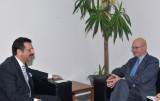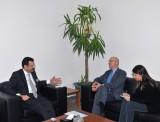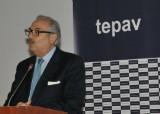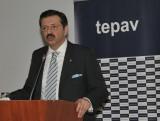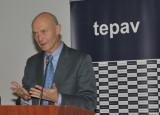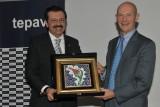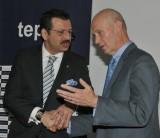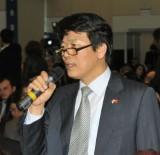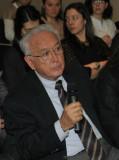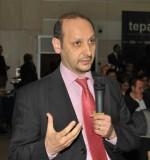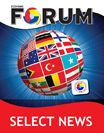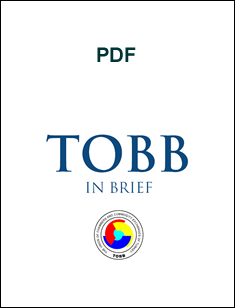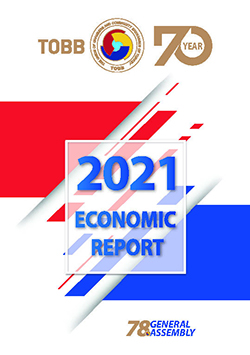Protectionism is not a solution in terms of growth and employment
15.03.2013 / Ankara
M. Rifat Hisarcıklıoğlu, President of TOBB, who made a speech at the meeting “Approaching 9th WTO Ministerial Conference: Expectations from the World Trade Organization” which was held at TEPAV with the participation of Pascal Lamy, General Director of WTO, stated that it was meaningless for countries to take shelter under protectionist policies for the purpose of caring for their national industries, and said, “Our experiences proved that protectionism is not a solution in terms of growth and employment. Protectionism does not improve competitive power, or increase productivity".
Pointing out that in addition to protectionism, new quests were seen in international trade, Hisarcıklıoğlu said, “Countries are increasingly turning to bilateral or regional trade agreements. There is an important increase in the number of such agreements. However, we hope that this trend does not weaken the multi-lateral system. For instance, Preferential Trade Agreements have not yet been put into effect in Islamic countries and Economic Cooperation Organization countries due to protectionist reflexes. Negotiation are carried out in every platform, but no result has been attained. We see that the multi-lateral system may hardly satisfy all expectations. However, as the business world, we should first expand our vision, and think of the long-term."
“9. The meeting “Approaching WTO Ministerial Conference: Expectations from the World Trade Organization” was held at TEPAV. The meeting was honored by M. Rifat Hisarcıklıoğlu, President of TOBB, Pascal Lamy, General Director of the World Trade Organization (WTO) and Bozkurt Aran, Director of TEPAV Trade Studies Center, and each of them made a speech.
In his speech, Hisarcıklıoğlu said he had the honor of seeing Pascal Lamy, General Director of WTO at TEPAV and provided information about the efforts of Lamy. Pointing out that the world was going through an economic and political reshaping process, Hisarcıklıoğlu said, “The globalization process also changes the balance of power in the world. While the roles of USA and other developed countries who traditionally played effective roles in the world economy change, the existence of emerging economies are seriously felt."
-The point of gravity shifted from Atlantic to the Pacific
Pointing out that the economical and political points of gravity of the world shifted from the Atlantic to the Pacific, Hisarcıklıoğlu said, “The epicenter of change is this geography where Turkey stands in the center. While the countries to our west are struggling with economic crises, the countries to our south and east are experiencing political crises. That is because the peoples of the region have raised their expectations and started lifting up their voices for their legitimate demands. To our west lies Europe, the biggest consumption market, and to our east lies Asia, the biggest production market. Our neighbors in the north and south possess the biggest energy resources in the world. At their center lies Turkey, a country committed to being a much active player in the world economy and trade.
Turkey has become a stable, powerful and balancing country in the middle of a geography which is shaken by economic crisis in the west and political unrest in the south and the east.
Being both a European, an Asian, a Mediterranean by its position, Turkey has become prominent and has been a chance for the region with its political stability and economic stability gained in the last 10 years in a geography surrounded by economic and political tension.
In summary, Turkey is now listed among the most important economies in every sector in Europe and the world, and is advancing with speed in its path. With this rise, Turkey aims at becoming more effective in the multi-lateral trade system. Yet, as the Turkish Private sector, we believe that the efforts of the World Trade Organization will attain success only with the contribution and participation of the private sector."
-Made in World phrase
Reminding that Pascal Lamy, the guest of the meeting, had said that the phrase "Made in the World" would be seen on the products during his speech on February 26 in Lausanne, President of TOBB said, “You say that there will be no more "Made in the UK" or "Made in Germany”. In fact this fears us on the one hand, but on the other hand, we know that it brings new opportunities. We have great expectations that it may be possible based on liberalization of trade, transparent and foreseeable rules.” Pointing out that he last 10 years had unfortunately been very hard in terms of the multilateral trade system and WTO, Hisarcıklıoğlu said, “The desired end could not be reached in any way in the Doha Round negotiations continuing since 2001.”
-Multilateral system is an insurance despite all its deficiencies
Pointing out the fact that the multilateral system was like an insurance of the negotiation environment which includes any country and the superiority of law despite all its deficiencies, M. Rifat Hisarcıklıoğlu, President of TOBB, said “The solution of problems experienced with the bilateral and regional trade agreements lie in the multilateral system".
Saying that there were obstacles, for example, before trading with EU Countries with which they had a Customs Union agreement, Hisarcıklıoğlu added,
“I would like to emphasize some issues which we think are contrary to the spirit of Customs Union: While Turkey’s industrial products enter the EU market freely, entrepreneurs who will market these goods face the visa obstacle. They say your goods may come, but you may not. On the other hand, a carrying quota is imposed on vehicles that will carry the goods. Our companies are told “bring your product, but do not bring the truck that carries them”.
Another problems is related with the Free Trade Agreements made with third countries. While EU is free to sign Free Trade Agreement with third countries without negotiating with us, we face difficulties in signing Free Trade Agreements with the same countries. We are exposed to quite unfair and illegal treatment in these three areas. We, as the Turkish private sector, want the ways to be cleared for unilateral system, and that it becomes a functional system where any country is not excluded.
Richness depends on trade. For the enrichment of the peoples, the ways for trade and investment must be cleared. We defend this in any platform we attend. Even, we say that Trade and Investment should be handled as permanent headings in the agenda of G20.
Trust is a prerequisite to guarantee investment and employment by the private sector. However, the global trade environment does give confidence to the private sector. It is essential for the World Trade Organization to be successful in assuring that confidence.”
-'Cracks in the international negotiation system'
Pascal Lamy, General Director of WTO, said that trade which once was under the control of rich countries now became controllable by poorer countries.
Lamy stated that stated that 2012 was the first year since the 17th century during which the poor countries produced more than the rich countries, and this unfolded some cracks in the international negotiation system.
Drawing the attention to the fact that USA and European Union started negotiating a “mega bilateral” agreement”, Lamy said, “They were expected to discuss certain issues regarding transatlantic open trade, and they could not do it with WTO. Some said, 'We cannot do this with WTO, China prevents it.' Some said, (We should not do this with WTO, because we have to retain control.)".
Lamy said that the to-do-list in trade included "executing a study to carry out trade with much limited political energy", and the agenda of the 9th WTO Ministerial Conference to be held at the end of the year would include simplification of trade and reducing costs of crossing borders.
Stating that Turkey, a hot point of junction between the east-west and south-north, facilitates the trade crossing its borders and that he expected the same from other countries, said, "I hope that the balance of the negotiations go in that direction."
Your message has been sent
Thank you |
